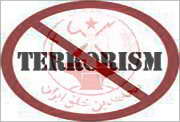Iraqi security forces arrested the spokesman of the terrorist Mojahedin-e Khalq Organization  (MKO also known as the MEK, PMOI and NCR) in Iraq, local media reports said.
(MKO also known as the MEK, PMOI and NCR) in Iraq, local media reports said.
According to "Ashraf News" website, Mohammad Eqbal was arrested after the office of the Iraqi prime minister issued an arrest warrant for him on charges of provoking MKO members against the Baghdad government and the terms of the Baghdad agreement with the UN on the presence of the terrorist group in Iraq.
Eqbal has also been charged for resistance against the Iraqi government’s decisions, specially evacuation of the MKO terrorists from the group’s main training camp, Camp Ashraf (now the Camp of New Iraq).
Earlier in July, Iraqi Prime Minister Nuri al-Maliki and the UN Secretary-General’s Representative in Iraq Martin Kobler agreed to put an end to the dossier of MKO’s presence in Iraq in accordance with the deadlines announced last year.
According to a statement issued by the prime minister’s office, Maliki met with Kobler in his office. During the meeting, the two sides emphasized the importance of cooperation and coordination between the Iraqi government and UN representation to help it perform the tasks entrusted to it.
"They also discussed issues of common interest," said the statement.
The MKO, whose main stronghold is in Iraq, is blacklisted by much of the international community, including the United States.
Before an overture by the EU, the MKO was on the European Union’s list of terrorist organizations subject to an EU-wide assets freeze. Yet, the MKO puppet leader, Maryam Rajavi, who has residency in France, regularly visited Brussels and despite the ban enjoyed full freedom in Europe.
The MKO is behind a slew of assassinations and bombings inside Iran, a number of EU parliamentarians said in a recent letter in which they slammed a British court decision to remove the MKO from the British terror list. The EU officials also added that the group has no public support within Iran because of their role in helping Saddam Hussein in the Iraqi imposed war on Iran (1980-1988).
Many of the MKO members abandoned the terrorist organization while most of those still remaining in the camp are said to be willing to quit but are under pressure and torture not to do so.
The group, founded in the 1960s, blended elements of Islamism and Stalinism and participated in the overthrow of the US-backed Shah of Iran in 1979. Ahead of the revolution, the MKO conducted attacks and assassinations against both Iranian and Western targets.
The group started assassination of the citizens and officials after the revolution in a bid to take control of the newly established Islamic Republic. It killed several of Iran’s new leaders in the early years after the revolution, including the then President, Mohammad Ali Rajayee, Prime Minister, Mohammad Javad Bahonar and the Judiciary Chief, Mohammad Hossein Beheshti who were killed in bomb attacks by MKO members in 1981.
The group fled to Iraq in 1986, where it was protected by Saddam Hussein and where it helped the Iraqi dictator suppress Shiite and Kurd uprisings in the country.
The terrorist group joined Saddam’s army during the Iraqi imposed war on Iran (1980-1988) and helped Saddam and killed thousands of Iranian civilians and soldiers during the US-backed Iraqi imposed war on Iran.

